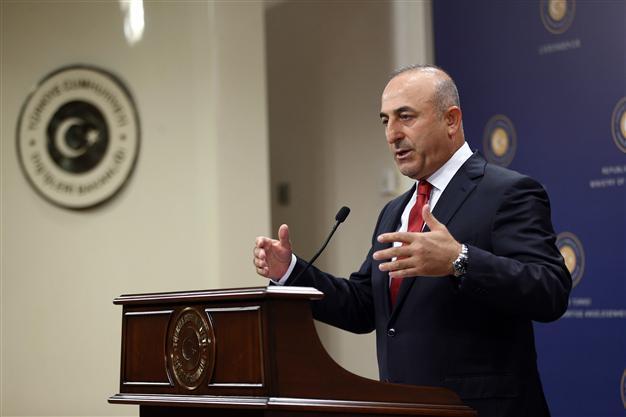Turkey accuses BBC of ‘openly supporting terrorism’
ANKARA

Turkish Foreign Minister Mevlut Cavusoglu gives a press conference in Ankara on July 25, 2015. AFP Photo
Turkey has accused the British Broadcasting Corporation (BBC) of “openly supporting terrorism” by making “written and visual propaganda” of the outlawed Kurdistan Workers’ Party (PKK) during a broadcast on Aug. 20.
“Such broadcasting about an organization which is listed as a terrorist [organization] by many countries, particularly EU countries, is open support for terrorism,” the Turkish Foreign Ministry said Aug. 21.
The broadcast, which portrayed the PKK as “an innocent organization struggling against another terrorist organization and encouraged [people] to join the PKK, is not acceptable in any way,” the ministry said in a written official statement.
This is not the first time that Turkish authorities have targeted U.K. media outlets’ reporting on the PKK, which is listed as terrorist organization by a large portion of the international community including the European Union and the United States, in addition to Turkey.
In 2005, then-Prime Minister Recep Tayyip Erdoğan harshly criticized the BBC and Reuters for describing PKK members as militants and guerillas instead of terrorists.
“Only in last one month, the PKK terrorist organization has slayed 64 people, wounded 350 persons, kidnapped 16 persons, sabotaged railways and dams and attacked transportation infrastructure and vehicles,” the ministry said, underlining that the BBC broadcast was “a concrete indication and evidence that terrorist organizations have been nourished by this irresponsible and hypocritical approach and support.”
“The BBC is expected to apply its broadcasting policy, which it followed in regards to IRA [the Irish Republican Army] which recently launched a bomb attack against a police barracks in Northern Ireland, to the PKK terrorist organization, too,” the ministry said.
At the time, in response to Erdoğan’s criticism in 2005, the BBC said taking into consideration the specific conditions of each incident, it prefers to use more descriptive words such as “bombers, attackers, armed people, kidnappers, rebels and militants” when reporting about perpetrators of violent incidents.
The BBC also said it avoided using the term “terrorist” for the IRA, for fear of sparking Catholic reactions in Ireland.
